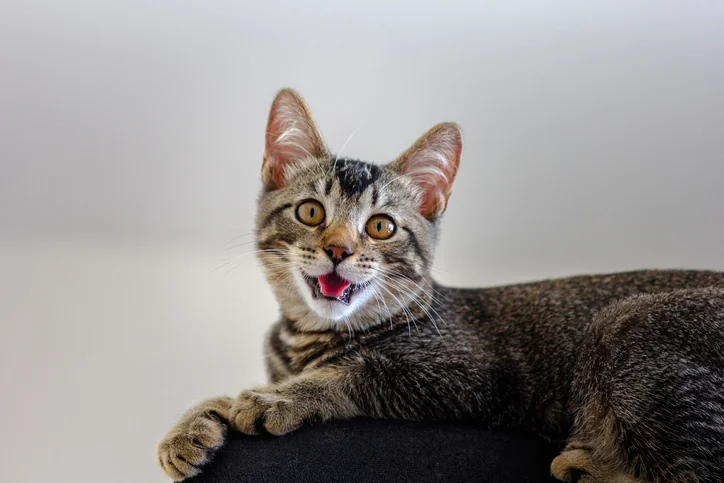Why Does My Cat Keep Wheezing?

Why Does My Cat Keep Wheezing?
Cats can wheeze for a variety of reasons. Pet owners should be aware of the common reasons that cats wheeze since this can be a symptom of other health issues that need to be addressed. From feline asthma to lung disease, there are many causes of this symptom in cats. Knowing what is causing the problem can be key to getting your cat the help that they need to feel better.
If you believe that your cat has been wheezing, but you do not notice any other symptoms that cause you concern, you should still take your pet to the veterinarian. Sometimes cats can hide how they are feeling hide and it can be easy to miss other serious symptoms. Being sure about the reason for your cat’s wheezing can help to ensure that they get the care they need as soon as possible.
1. Feline Asthma
This is the most common reason for a cat to wheeze. Just as in humans, some cats can be prone to inflammation in the airways which can lead to wheezing. This might be caused by exposure to an allergen or an illness that sparked long-term breathing troubles. Cats with asthma can be treated with an inhaler and other medications that help to keep their lung free of inflammation.
2. Laryngitis
Cats can actually lose their voice and get laryngitis, just like people. When this condition is linked with irritation in the throat and the lungs, your cat might sound like it is wheezing when it tries to breathe or meow. This condition usually just takes time to heal on its own, but your vet might prescribe some additional supportive medications that can be used to manage inflammation and pain related to a throat injury or an illness.
3. Lung Disease
Cats with lung disease can also experience wheezing. These conditions can range from mild problems related to long-term allergies or be more serious, like lung cancer. Your vet will want to run some tests on your cat to see which of the various lung diseases might be causing your cat to wheeze. Your veterinarian will develop a treatment plan for you after your cat is diagnosed.
4. Obesity
Pets that are overweight might struggle to get around and take care of basic daily needs like eating and drinking or climbing up and down off the furniture. Their extra body weight can lead to wheezing and other difficulties with breathing. Cats that are overweight might also have sleep apnea, which can be particularly hard on pets that have narrowed airways or are part of the brachycephalic breeds.
5. Parasites
There are various parasitic infections that can cause significant breathing issues in cats. Feline heartworm, as well as lungworms, can cause breathing trouble in cats. These parasites can also cause significant damage to the heart and lungs. These parasites need to be treated right away to protect your cat’s health.
6. Upper Respiratory Infection
Cats with bacterial or fungal infections in the lungs can experience wheezing and coughing. Sneezing and watery eyes are also commonly linked with these conditions, as is congestion. The brachycephalic breeds are the most prone to suffer from this kind of condition, but any cat of any breed can get an infection related to a cold or inhaling an allergen.

7. Cardiac Issues
Cats with heart problems might show all kinds of symptoms that indicate that they have trouble breathing. When the heart does not work as it should, fluid can build up in the lungs. This can lead to noisy and labored breathing, as well as coughing and retching. Cats with severe heart conditions might wheeze all the time when they breathe.
Cardiac issues require that your vet manage your cat’s symptoms with heart medications, as well as other supportive care routines. The prognosis for heart conditions is much better when they are caught and treated early after the onset of symptoms.
How Do I Know When to Call the Vet?
You might still be unsure about when the vet needs to get involved. If your cat seems to be wheezing and then stops for days at a time, they might still need medical attention. You should consider a trip to the vet if your cat’s wheezing lasts for more than a few hours or if the noise that they are making is new. Look out for panting like a dog or coughing.
If your cat is hiding, have lost their appetite, or has a blue or gray tongue, your cat could be suffering from breathing troubles. Head to the emergency vet right away if your cat seems to be struggling to breathe or appears to be in distress. The occasional cough, wheeze, or snore can be normal, but anything more serious that goes on for a prolonged period of time necessitates reaching out to your vet.
Cats Can Get Asthma Just Like Humans
Many cat owners are not aware that their cat can get asthma. This is a common condition in cats that have seasonal allergies or in breeds that are brachycephalic. Asthma can usually be easily managed if you know the root cause of your cat’s wheezing. Make sure to work with a vet to figure out the exact diagnosis for your cat’s breathing difficulties so that they can get the help and treatment they need.
If your cat is wheezing in the Chicago, IL area, contact West Loop Veterinary Center. We have two locations, West Loop and Streeterville, and are dedicated to making your pet’s care our highest priority. Our veterinarians will ensure that your cat receives the compassionate care and treatment for their wheezing.
Contact us today by calling our West Loop location (312) 421-2275, our Streeterville location (312) 766-5959, or book an appointment online.
West Loop:
(312) 421-2275
Streeterville:
(312) 766-5959
